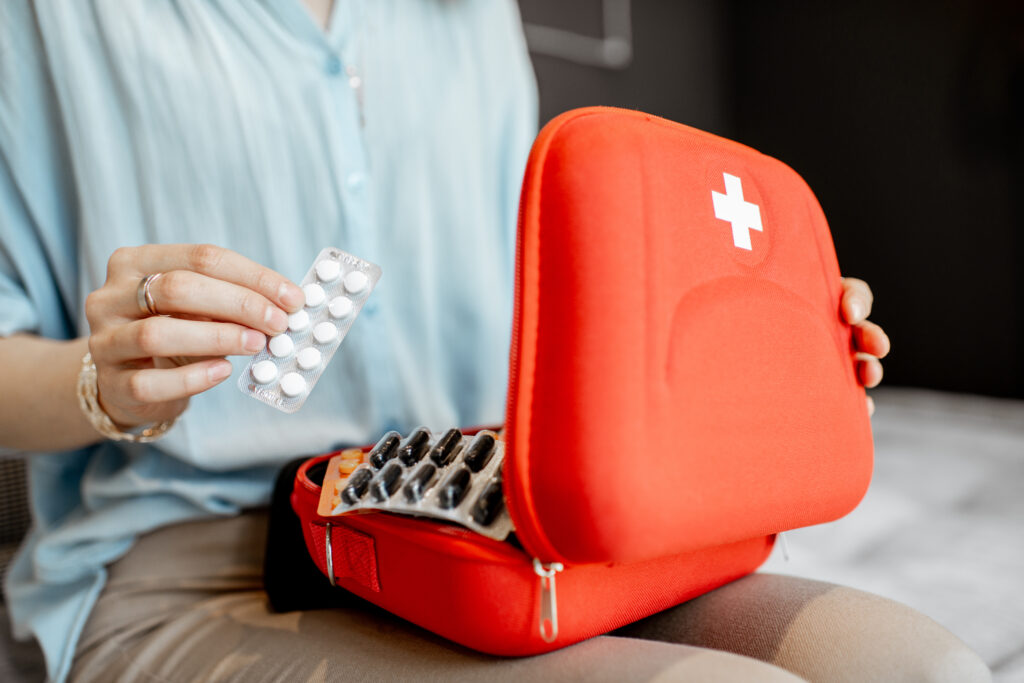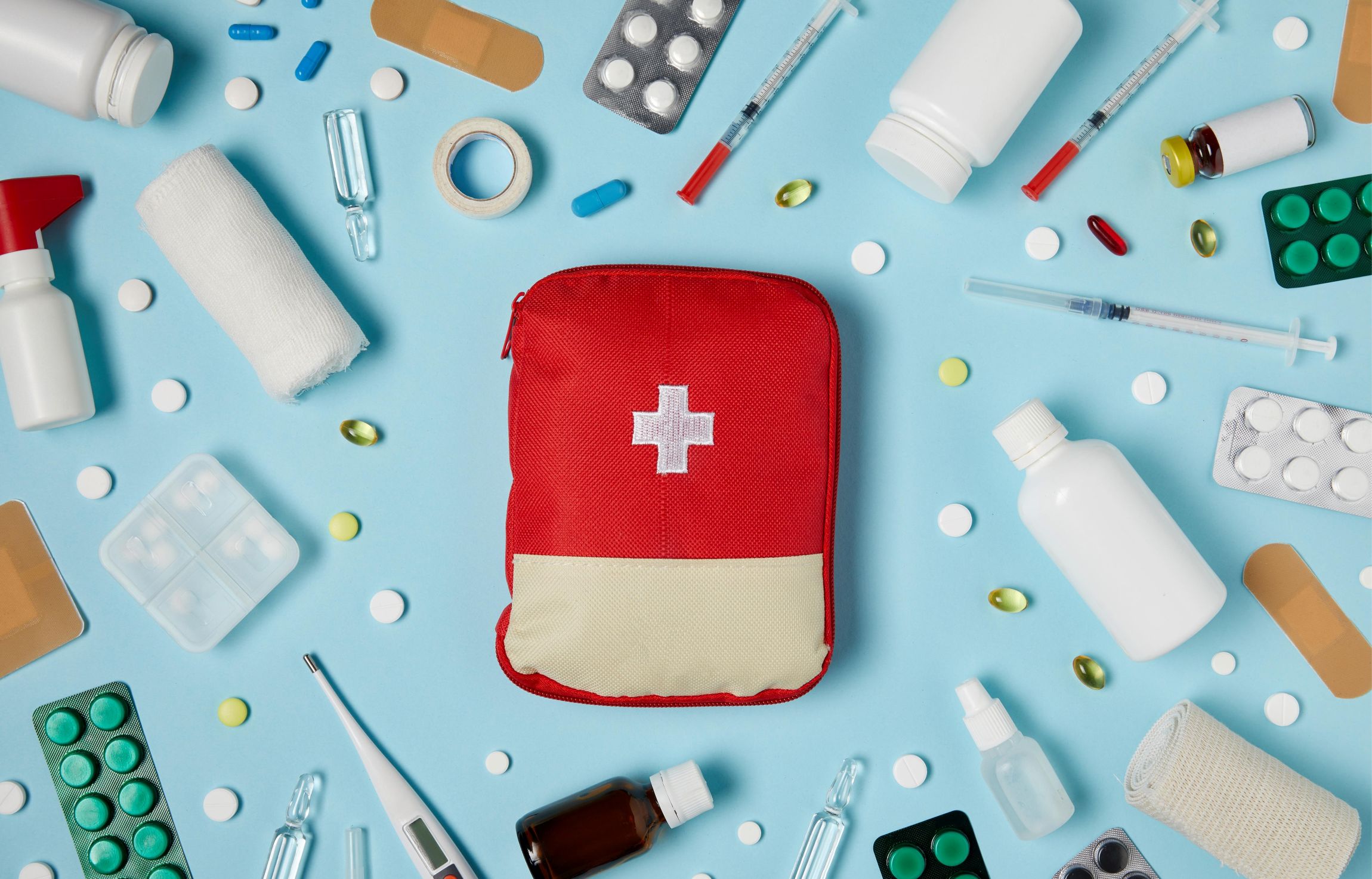Vacation is one of the most exciting times of the year, when we can finally break away from our daily routines and enrich ourselves with new experiences. As part of careful preparation, it is worth compiling a detailed list of the most important items for your summer travel first aid kit. However, in order for this period to be truly relaxing, it is essential to prepare properly, which should be started in good time so that all necessary medicines and vaccinations are available before the trip. One of the cornerstones of this is a carefully compiled summer travel first aid kit, which helps to prevent or quickly treat the most common health complaints and also contains the medicines and preparations recommended for travel.
Why is a summer travel first aid kit important?
During a trip, minor accidents, illness, discomfort, or digestive problems can occur—especially if we try unfamiliar foods, spend a lot of time in the sun, or are in unfamiliar surroundings. These problems can easily disrupt our trip if we are not prepared. In such cases, basic medicines packed in our travel first aid kit, such as fever and pain relievers, anti-nausea medications, or sunburn relief creams, can provide quick relief. In certain cases, such as allergic reactions or severe headaches, it is especially important to have the right medicine with us and to know how to use it. With a well-stocked first aid kit, we can avoid a simple ailment stealing hours of our relaxation time.
What should a basic travel first aid kit contain?
Your basic summer travel first aid kit should definitely include some of the most important medicines you may need during your trip. These include:
- regular medications
- fever and pain relief tablets (e.g. paracetamol, ibuprofen, metamizole),
- anti-inflammatory medication,
- anti-diarrhoea medication,
- probiotics for mild digestive problems,
- medication for nausea and vomiting,
- antihistamines for allergies, especially if you are prone to allergic reactions or swelling after insect bites,
- medication for insect bites, insect repellent spray,
- cooling gel or cream for sunburn, or other skin care cream to protect the skin,
- disinfectant, bandages and sterile gauze,
- cream for joint and muscle pain
- thermometer
- hand sanitizer.
It is important to take proven medicines and preparations with you that have already proven to be effective. If you need special medicines (e.g., insulin, EpiPen, or other preparations that require special storage), don’t forget them. When putting together a travel first aid kit, always consider what you are most likely to need at your destination.
When putting together a summer travel first aid kit, it is also worth considering the destination country: in tropical regions, greater emphasis should be placed on protection against infections, while for mountain hikes, wound care supplies may be more important.

The role of regular medications in your summer travel first aid kit
For those who take medication regularly, putting together a summer travel first aid kit is particularly important. In the case of chronic conditions such as high blood pressure, diabetes, thyroid problems, or cardiovascular disease, missing a daily dose of medication can have serious consequences. Special attention should be paid to special medications that may require refrigeration or other special storage or handling. Therefore, these preparations should always be included in the most important luggage for the trip! It is recommended to pack at least a few days’ supply, as well as to keep the original packaging and patient information leaflet. When traveling by plane, it is advisable to keep these in your carry-on luggage and, if necessary, to bring a medical certificate or a copy of the prescription with you. This way, you will not only take care of your health, but you will also be prepared for any customs checks or emergency care.
Skin and eye protection during summer travel
During summer travel, it is worth paying special attention to protecting your skin and eyes, as sunlight, salt water, and even wind can put a strain on your body—especially when traveling to exotic countries. In such cases, it is essential to take high-factor, broad-spectrum sunscreen with you, which provides reliable protection against UV rays. After-sun creams and sprays can also be useful for soothing and regenerating the skin if necessary.
Eye protection is also extremely important, especially during beach or mountain vacations, where sunlight reflection puts increased strain on the eyes. It is worth taking UV-filtered sunglasses with you and, if necessary, packing eye drops in your summer travel first aid kit so that you are prepared to treat dry eyes or irritation.
Don’t forget about any medication you take regularly: before traveling, check that you have all the necessary medication with you, and make sure you have fever and pain relief medication, as well as medication for nausea. A thermometer can also be useful, especially if you are traveling to an exotic country where the risk of infectious diseases may be higher.
When traveling abroad, it is particularly important to observe hygiene rules: use hand sanitizer regularly and carry wound disinfectant with you so that you can react quickly in case of minor injuries. If you suffer from a chronic illness, be sure to consult your doctor before traveling and take the necessary medications and certificates with you. This way, you can be sure that you are prepared for any situation during your vacation and that you are protecting your health.
Tips for storage
The summer heat poses a particular challenge when it comes to storing medicines. Some preparations, such as insulin or certain antibiotics, are heat-sensitive, so it is advisable to transport them in a cooler bag and never leave them in direct sunlight or in a car, as even 5-10 minutes is enough for them to heat up to a temperature higher than the permitted level. At the same time, it is important to note that certain medications can also be damaged by cold temperatures, so excessively low temperatures should also be avoided. Medications can even freeze in the freezer compartment of the refrigerator, so it is better to store medications that require refrigeration in the refrigerator door. Following the storage instructions provided in the patient information leaflet will help to preserve the effectiveness of the medicines. Storing medicines safely is just as important as purchasing them.
Summary
A well-stocked summer first aid kit is not only a matter of convenience, but also of safety. Whether it’s quick treatment for minor ailments or ensuring a steady supply of regular medication, being prepared is key to ensuring that your vacation is truly carefree.
Sources:
- EgészségKalauz: Tökéletes útipatika: ezeket ne hagyja otthon ha nyaralni megy! | EgészségKalauz
- WEBBeteg: Úti patika – Mit vigyen magával utazásra, nyaralásra? – WEBBeteg


